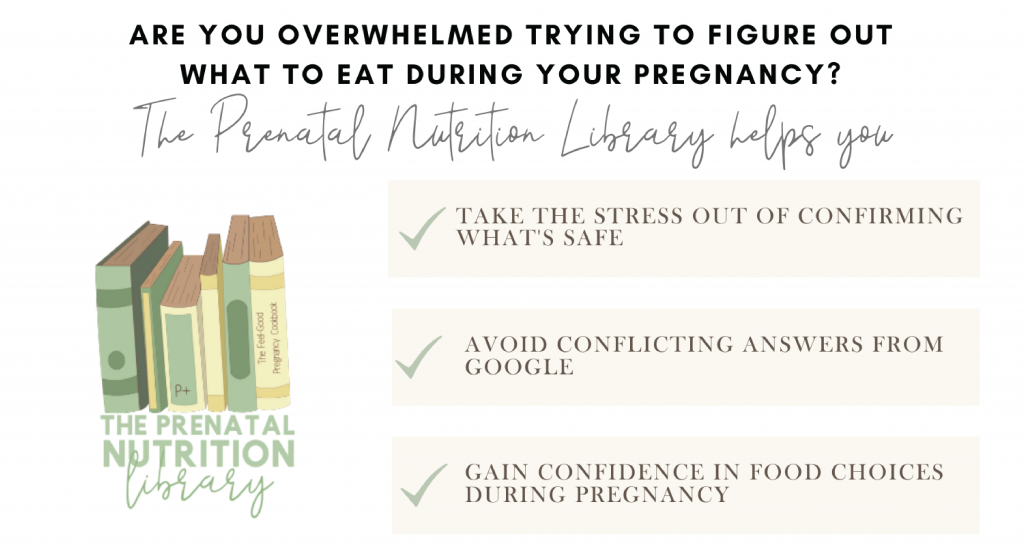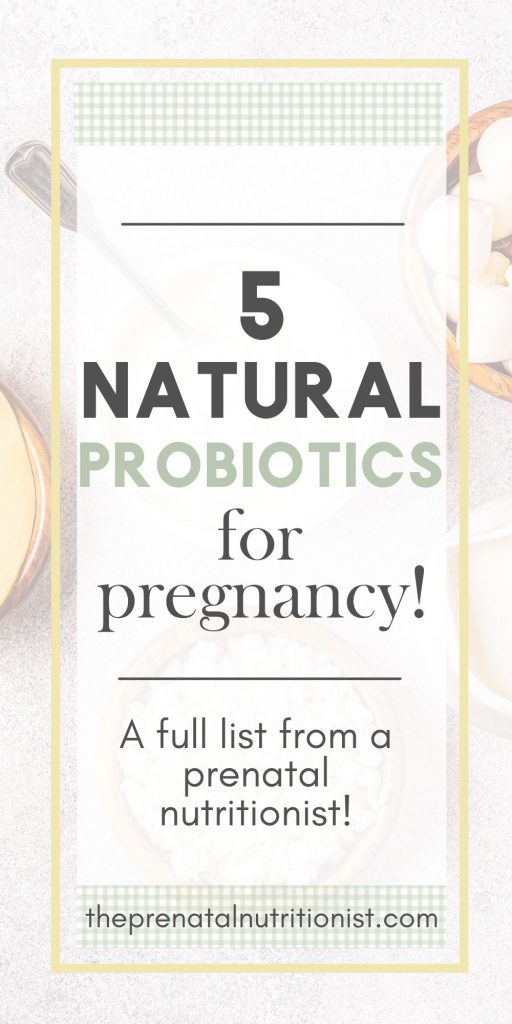
Probiotics are live microorganisms. Similar to those found in your digestive system. These “good” bacteria do a lot to keep you healthy.
But are probiotic foods safe to eat during pregnancy? Absolutely. Probiotics and pregnancy go hand-in-hand. I consider them to be an essential part of the pregnancy diet. A healthy gut can make a big difference in your pregnancy’s overall health and comfort.
There are plenty of benefits to probiotic supplements too. But I always encourage food first. Probiotic-rich foods provide a wide variety of probiotic strains and benefits. These natural food sources make getting probiotics during pregnancy easy. They’re delicious, nutritious, and especially beneficial for pregnant women.
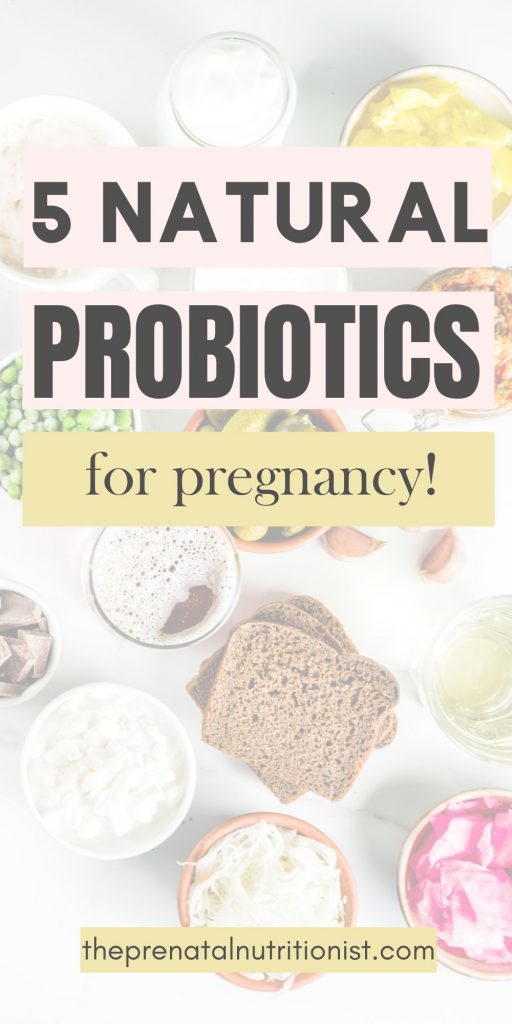
5 Natural Probiotics for Pregnancy
Kefir
Kefir is a fermented probiotic milk drink. It adds kefir grains to cows, goats, or sheep’s milk. The actual kefir grains are cultures of lactic acid bacteria and yeast.
Kefir has a reputation for being one of the best natural probiotics. And it provides numerous health benefits. The best part is that it tastes great. This is why a lot of people prefer it over other fermented foods. Especially when trying to add natural food sources of probiotics to their diet. It is also a good source of calcium and vitamin D, which are important for pregnant women and their growing babies. Add kefir to a smoothie, drizzle it over granola, or drink it plain. Learn more about how to consume kefir safely while pregnant.
Yogurt
Yogurt is loaded with nutrients that expecting mothers need. In fact, yogurt is one of the most popular food sources of probiotics. But only as long as you choose the right kind. Not all yogurt contains active cultures, and some have added sugar.
Read the labels when shopping for yogurt. If the yogurt has live and active cultures, it will say somewhere on the packaging. Also, pay attention to the ingredients. You want to avoid yogurts with too much added sugar or artificial sweeteners. I also encourage choosing full-fat dairy products, especially during preconception and pregnancy!
Sauerkraut
Sauerkraut is a natural food source of probiotics. It’s made from fermented cabbage. It is especially significant to eat during pregnancy because it also contains some folate. Unpasteurized fermented dishes pose a slightly higher risk for the potential to cause food borne illness. However, unpasteurized sauerkraut is what has the probiotic benefit. So, it’s a personal choice of whether to include this food or not. Weigh the benefits versus the potential risk for yourself!
Kimchi
Kimchi is a traditional Korean sauerkraut. It can be slightly spicy. It’s usually made with fermented vegetables like cabbage and Korean radish. Kimchi is loaded with probiotics and a great source of vitamins A and C. Like with sauerkraut, being food-safe and aware is important. Be sure to check expiration dates and store them properly.
Kombucha
Kombucha is a fermented tea beverage. It’s a natural source of probiotics. Kombucha may help improve gut health– it has been touted for a lot of other health benefits but many are not supported by science just yet. It may also be helpful when dealing with constipation. It’s important to consider added sugar and caffeine. Kombucha does contain small amounts of alcohol. The amount of alcohol is likely similar to that in other fermented foods though. However, this could vary per brand. Learn more about kombucha inside The Prenatal Nutrition Library.
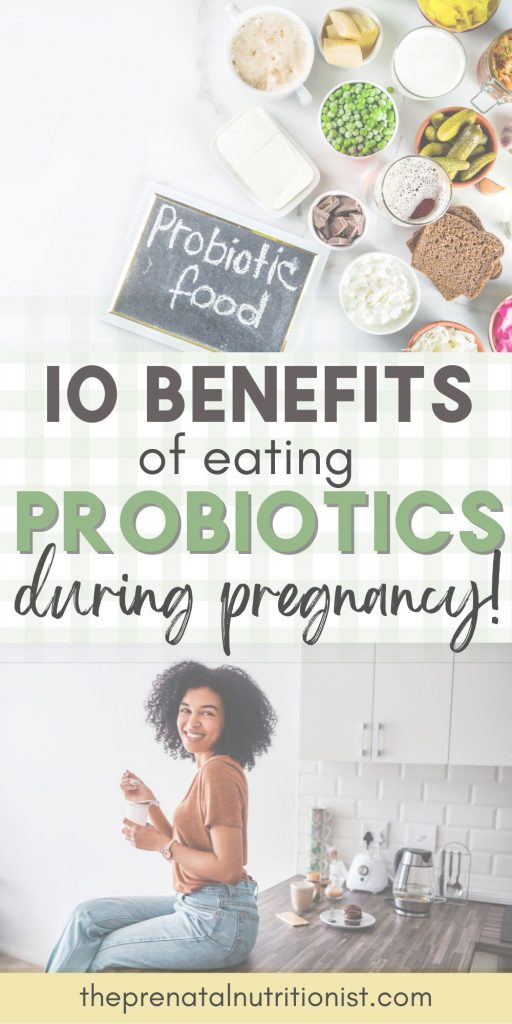
Benefits of Probiotics in Pregnancy
Nausea, Vomiting, and Constipation Relief
Nausea and vomiting occur in about 85% of pregnancies. Luckily, probiotics may provide some relief. Researchers at the UC Davis School of Medicine found that probiotics can significantly reduce pregnancy-related nausea, vomiting, and constipation.
Better Digestion and Nutrient Absorption
Probiotics can also improve your gut health and nutrient absorption. Pregnant women frequently experience digestive issues like constipation and diarrhea. The good bacteria in probiotics can help keep things moving through your digestive system. So, probiotics have the potential to offer natural relief. Improved gut health can also mean better nutrient absorption!
Stronger Immune System
Using probiotics to improve your gut health will also support your immune system. The good bacteria in probiotics help to decrease inflammation, as well as strengthen your immunity. With a more vigorous immune defense, your body is better equipped to fight illness. Staying healthy is especially important when you’re pregnant.
Improves Baby’s Microbiome
During delivery, babies come into contact with their mother’s gut bacteria. Your gut health will influence your baby’s microbiome! This means focusing on improving your gut health early on can help set your baby up for better digestive health. Remember, better gut health can also lead to a stronger immune system.
It helps To Prevent Vaginal Infections.
Pregnancy really does a number on your hormones and immune system. Those changes can lead to a suddenly increased susceptibility to vaginal infections. Probiotics are great for helping to reduce the risk of infections by using good bacteria to support vaginal health. This systematic review and meta-analysis discuss the role of probiotics in preventing vaginal infections and maintaining good vaginal health.
Reduced Risk of Gestational Diabetes
Probiotics have been and continue to be explored as supporting reducing the risk of gestational diabetes. However, the research has mixed results, and more work needs to be done. With that said, due to all the other benefits of probiotic-rich foods, they don’t hurt to incorporate!
Reduced Preeclampsia Risk
Preeclampsia is high blood pressure during pregnancy. It is one of the leading causes of maternal death. When uncontrolled, it can be a dangerous pregnancy condition. Research has suggested a potential association between probiotic lactobacilli and a reduced risk of preeclampsia, especially severe preeclampsia. The anti-inflammatory properties of probiotics also offer their potential to reduce the risk of preeclampsia.
Reduced Risk of Postpartum Depression
Probiotics may also have the potential to reduce your risk of postpartum depression. There is a strong connection between a healthy gut and improved mental health. Research suggests that thanks to their antioxidant properties, probiotics can increase GABA (gamma-aminobutyric acid), improving your mood. This is another exciting and ongoing area of research.
It may help with Postpartum Weight Loss.
Probiotics may also have the potential to help you lose weight after giving birth. As a reminder, the focus after delivery should be on rest and recovery, but I know this is a topic on the mind of many pregnant people. It’s not a quick fix, but probiotics will release an appetite-reducing hormone (GLP-1) and may improve your body’s ability to lose weight.
Atopic Dermatitis (Eczema) and Food Allergy Prevention for Infants
Atopic dermatitis, or eczema, is a skin condition common in infants and children. Some research has found a connection between ingesting probiotics and a decrease in eczema. Probiotics boost your immune system, which is one reason they may decrease the likelihood of developing eczema. As well as some allergies. In the case that your baby does eventually display symptoms, it’s possible that babies whose mothers took probiotics during pregnancy may have less severe symptoms.
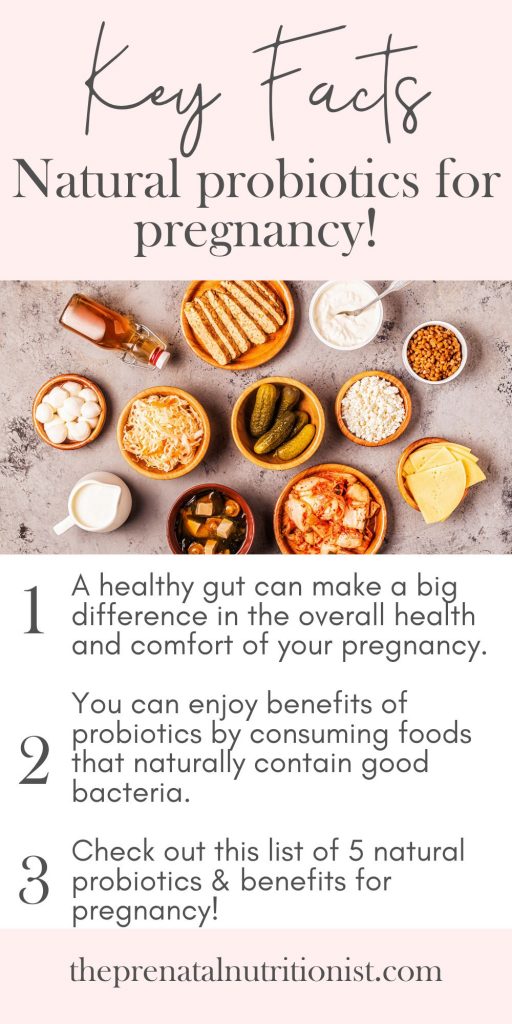
Tell me your favorite probiotic-rich food in the comments below!
I would love to hear more about your favorite probiotic-rich foods, especially during pregnancy. Whether you’re pregnant, trying to conceive, or want to know more about how food and nutrition can improve your quality of life, I encourage you to join The Prenatal Nutrition Library (TPNL). The Prenatal Nutrition Library is a searchable database, so you will have peace of mind that what you eat during pregnancy is safe and nutritious. Click here to learn more.
